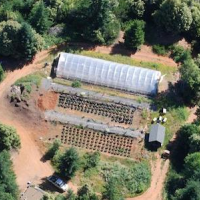Federal and State Agencies Join Yurok Tribe in Humboldt Raid on Pot Farmers
 A pot farm in Humboldt. (photo: Yurok tribe)
A pot farm in Humboldt. (photo: Yurok tribe)
California just endured the hottest six months in its recorded history, but that didn’t stop state and federal government agencies from joining with the Yurok tribe to turn up the heat on marijuana growers blamed for sucking up the reservation’s water in Humboldt County.
The California National Guard, the U.S. Bureau of Indian Affairs, the Yurok police, the Humboldt County Sheriff and others fanned out on Monday with search warrants in hand, looking for illegal pot farms. Yurok Interim Public Safety Chief Leonard Masten told the Los Angeles Times he anticipated that tens of thousands of plants would be eradicated during the next 10 days by participants from the dozen or so agencies.
Pot growing in Humboldt is anything but new, and the Yurok tribe has had its share of problems with their unwelcome neighbors. In September 2012, three large-scale marijuana operations were eradicated by some of the same agencies involved in the current raids. Tribe Department of Public Safety Chief Mary McQuillen warned at the time, “If you are growing pot on the reservation, you are going to get caught.”
That wasn’t true. Pot growing in the area has grown, according to local observers, boosted by the growth of medical marijuana sales but complicated by the drought.
The National Oceanic and Atmospheric Administration (NOAA) reported on Monday that California broke the 80-year-old record for heat January-through-June. Temperatures were five degrees warmer than average and more than one degree hotter than the first six months of 1934. The heat wave follows California’s record-setting 2013.
Eighty-one percent of California is experiencing extreme drought or worse, up from 78%, according to a U.S. Drought Monitor map. Three months ago, it was 68%.
Water resources are drying up. Mountain snowpack that feeds streams and rivers is practically non-existent. Ground water is being drained at unsustainable rates. Rainfall is sparse. Longtime California agricultural choices, like growing water-sucking almonds in the desert, are receiving critical attention. And more natural activities, like growing marijuana in the woods of Northern California, are becoming problematic in their own right.
Creeks and springs that feed the Klamath River near the Yurok reservation are drying up and wells have been impacted. The state Department of Fish and Wildlife (DFW) released a report (pdf) last month that used Google Earth to scan the watersheds around two tributaries of the South Fork Eel River in Humboldt and found large-scale marijuana grows that threatened the ecosystem.
“We knew people were diverting water for marijuana operations,” DFW biologist Scott Bauer told the Associated Press. “We didn't know they could consume all the water in a stream.” Marijuana plants consume between 3 and 6 gallons of water each per day.
Marijuana grows pose problems for the Yurok besides reducing the amount of water available to them. Pesticides and other poisons used by growers to ward off critters pose a threat to plants, animals and fish through irrigation runoff.
Tribal members also tell of how low-impact growers in the past would be truck in their materials, like fertilizer, in stealth actions late at night. Now, they bring in heavy equipment during daylight and dominate traffic on tribal lands.
–Ken Broder
To Learn More:
Big California Raid Targets Marijuana Grown On Tribal Land (by Jennifer Baires, Reuters)
Massive Raid to Help Yurok Tribe Combat Illegal Pot Grows (by Lee Romney, Los Angeles Times)
California Was Hotter Than Ever During the First Half of 2014 (by Bruce Newman and Joe Rodriguez, San Jose Mercury News)
2014 Off to Hottest Start on Record for California (by Hector Becerra, Los Angeles Times)
First Six Months of 2014 Were Warmest in California's History (by Joseph Serna and Veronica Rocha, Los Angeles Times)
Pot Farms Are Draining Humboldt Streams Amid Chaos over Marijuana Regulation (by Ken Broder, AllGov California)
- Top Stories
- Controversies
- Where is the Money Going?
- California and the Nation
- Appointments and Resignations
- Unusual News
- Latest News
- California Forbids U.S. Immigration Agents from Pretending to be Police
- California Lawmakers Urged to Strip “Self-Dealing” Tax Board of Its Duties
- Big Oil’s Grip on California
- Santa Cruz Police See Homeland Security Betrayal in Use of Gang Roundup as Cover for Immigration Raid
- Oil Companies Face Deadline to Stop Polluting California Groundwater





